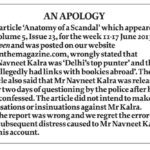The Man They Did Not Get
Why the pundits got Kejriwal wrong
 Mihir Srivastava
Mihir Srivastava
 Mihir Srivastava
|
11 Dec, 2013
Mihir Srivastava
|
11 Dec, 2013
/wp-content/uploads/2015/11/kejri-raj.jpg)
Why the pundits got Kejriwal wrong
The Aam Aadmi Party’s unprecedented debut in electoral politics—winning 28 of Delhi’s 70 Assembly seats—has surprised many. The party’s triumph is a first in many ways. Not only has it dislodged a 15-year-old state government and its Chief Minister, it has done so without ushering the usual opposition into power by default. It has defied the unwritten rules of how elections are fought and won in India. And it could mark the start of an alternative polity.
Before the election, AAP leader Arvind Kejriwal was seen by political pundits as an ambitious man who had gained popularity by exposing the rotten underbelly of India’s political establishment and by fighting for an anti-corruption law under the leadership of Anna Hazare, as someone who was trying to encash this popularity for political power.
Moreover, his popularity was seen as media hype. His yen for drama, for dharnas, the burning of electricity bills, his power pole theatrics, were all seen as petty attention seeking devices.
Sheila Dikshit called him an iconoclast. Others called him an anarchist. His views on swaraj were dismissed as naïve idealism, his intolerance of corruption as rabble-rousing, and his pledge to practice clean politics as populist rhetoric. The best way to deal with him, some pundits thought, was to ignore him.
Kejriwal espouses participative democracy. He insists that the aam aadmi decide what is best for him, instead of some politician or babu in some sarkari office. This is not simply his party’s ideology, he has said, but a political project. However trite it may seem, the AAP, to Kejriwal, is not just a political outfit but a movement of the people, by the people and for the people—against corruption and for participatory governance.
As the leader has made clear, it was the Anna Movement’s failure to persuade the Government to pass its proposed anti-corruption legislation—the Jan Lokpal bill—that motivated him to join politics. All along, he has minced no words in calling politics as usual a sham, a conspiracy, a game of dalals (wheeler-dealers) who work for vested interests in a corrupt system—and not for people at large.
The AAP was conceived of as an alternative to that kind of politics, and the Delhi Assembly election was seen as its pilot project. Political pundits saw little merit in it.
A paradigm shift in politics?
‘Ha!’ they thought.
The pundits have been proven wrong.
The problem, political pundits reasoned, was that AAP had no money. It was inconceivable for a party to contest an election without funds pouring in from corporate entities via either formal or informal channels (often as a quid pro quo for favours of ‘governance’). Reports estimate that the ruling Congress party spent Rs 380 crore on the Delhi election, and the BJP, Rs 450 crore. The AAP’s poll expenditure budget was just Rs 20 crore.
Party expenditure for the 2014 General Election is expected to be staggering. It is well known that the Congress, BJP and most other parties rely on dhanda money for their expenses. This results in a nexus between business and politics, as the Radia Tapes so dramatically showed.
The AAP’s independence of such funding has been evident to observers, and that nexus has been a focal point of Kejriwal’s attacks on ‘the system’. Earlier this year, he alleged that Mukesh Ambani’s Reliance Industries had used its influence to strike a favourable deal for itself in the Krishna-Godavari (KG) basin off the Andhra coast. Kejriwal suggested that S Jaipal Reddy had been moved out of the Union Petroleum Ministry at Reliance’s behest for asking too many inconvenient questions about its control of KG Basin gas. The AAP leader also drummed up noise over Congress President Sonia Gandhi’s son-in-law Robert Vadra’s dubious land dealings in Haryana, and against the BJP’s then President Nitin Gadkari, who was accused of a scam involving his businesses in Maharashtra. All of this made Kejriwal stand out as an earnest protestor against corruption who did not worry who was at the receiving end.
It was in keeping with a need to stay above the dirty fray that AAP asked the electorate to fund its election effort. As candidates, the party picked people from varied walks of life who wanted to make a difference and did not have the means to fight an election. The party relied solely on donations made by supporters, and actually stopped taking money after hitting its target of Rs 20 crore.
It worked. Most impressively so in Kejriwal’s New Delhi constituency, where he was elected to replace three-term Chief Minister Sheila Dikshit by a margin of 25,000 votes. It stunned political pundits who thought he had no chance of pulling off this upset.
That Kejriwal had popular support should have been clear from the donations he was gathering. His constituency manager Gopal’s list of donors included 12,000 families—half the total number in the New Delhi consituency, as Open reported. The pundits ignored what this meant. Preferring to discuss politics in the closed confines of news studios, guided by old parameters of politics as usually practised, they failed to see what was happening right under their noses in the country’s capital.
AAP had some 7,500 volunteers. Unlike BJP and Congress workers, who are either well off or are paid Rs 5,000 a week, AAP volunteers were actually working pro bono. They were there for the party’s cause. Many were qualified professionals who’d left lucrative jobs or taken extended leave without pay to be part of a new phenomenon.
While the BJP and Congress were busy bussing in thousands to fill vacant seats at their rallies, the AAP was working to coordinate a crowd of real enthusiasts, many of whom were happy to camp in hardship—sleeping on mats in cramped party offices—for their ideals. They would canvass door-to-door on foot, wearing the party’s iconic ‘Main aam aadmi hoon’ cap.
And they did not merely ask for votes, they asked people to outline their problems of daily life. They tabulated the responses; corruption, price rise, water and power, security, street lights and roads were some of the issues that bothered Delhi’s aam aadmi. In a new push for direct democracy, they promised to address exactly these issues. Also in contrast with its rivals, the AAP studiously avoided raking up issues of religion, caste and creed in its campaign.
Om Prakash Chauhan, a 60-year-old who is blind and has been a hawker in Connaught Place for 30 years, supports AAP for one reason: “They asked me about my problem and sought my advice on how to solve it.” He was at the AAP headquarters on Hanuman road when the results were declared, celebrating with rickshaw pullers, students, housewives, government servants, even businessmen. Brooms were hurled in the air. Though they knew the party would not necessarily get to run Delhi’s government, they were jubilant they had made their point loud and clear.
Politics would not be the same again. Kejriwal has said many times that his aspiration is not to hold office. He reasons that the aam aadmi is not bothered with who becomes Delhi’s CM; what he worries about is the cost of electricity, state of primary health infrastructure, of schools, and availability of water.
Kejriwal admits he is ambitious. But his ambition is to change the way politics is practised in this country. He says he is not open to backdoor negotiations and will make no private deals. If a corporate house wishes to make AAP an offer of support, it must do it openly and its financial contribution would be listed on AAP’s website.
Transparency has been the party’s hallmark—and so with candidate selection as well. Anyone could apply or have his/her name nominated by others. A screening committee shortlisted names for each constituency and put them on the party website for feedback from people at large. If there were an objection to someone (backed by proof), the person’s candidacy was struck off. Guided by such feedback, a final list was prepared by the party’s Political Affairs Committee, which includes Yogendra Yadav and Prashant Bhushan, among others, apart from Kejriwal himself.
When party member Prashant Bhushan was accused of taking a favour from UP’s Mayawati government in2011 after his family was allotted two 10,000 m2 farmland plots in Noida, this reporter asked the renowned lawyer for a detailed account of his personal wealth, assets and back accounts. He readily supplied these details despite the fact that he was not required to (as he didn’t hold any public office).
The internet was also used openly to guide candidates, with information on manifesto issues uploaded in real time. The party’s own surveys pointed to an AAP sweep, of which it even ran FM radio ad spots, but the pundits saw this as premature self congratulation.
The party’s response to allegations was interesting too. In a farcical episode a couple of weeks before polling, Anna Hazare wrote Kejriwal a letter accusing him of using his name to garner votes. Anna also sought a clarification on the use of India Against Corruption (IAC) funds. Political pundits called it a ‘letter bomb’, but Kejriwal made the letter public along with his reply, and offered to withdraw his candidacy if any wrongdoing were proven. “If nothing is found, we would like Anna to come to Delhi and campaign for us,” he had said. Anna, taken aback, told the media that his letter had been ‘personal’.
The party was also a target of sting operations trying to expose its own ‘corruption’, but none of these was convincing. Former BJP President Nitin Gadkari accused IAC of using ‘dubious’ foreign funds, alleging that Team Kejriwal was part of a foreign conspiracy to cast India’s democracy in suspicion. A month before the polls, Union Home Minister Sushil Kumar Shinde ordered a probe of the party’s alleged foreign funding. This, after Shinde himself had given AAP a clean chit on this count eight months earlier. Kejriwal welcomed the probe and requested that it be done in 48 hours. He also demanded a probe of how the Congress has mustered funds of some Rs 2,000 crore and how the BJP had so much money. That didn’t happen.
The news of Shinde’s probe, ironically, actually served the party well. Over the next five days, it collected an extra Rs 90 lakh in sympathy donations. It was enough to meet the Rs 20 crore target.
It was on 7 April this year that Kejriwal ended his 15-day fast and announced that AAP would contest all 70 seats in Delhi, where he had been protesting against ‘inflated’ electricity and water bills. Pundits said his fast had been a failure because his satyagraha, unlike Anna’s earlier, didn’t lead to any action by the Delhi government. Kejriwal’s fast was summarily ignored by most of the media. CM Sheila Dikshit, under no media pressure to act, didn’t even correspond with Kejriwal on this issue. But while he fasted, AAP workers went door-to-door across the city, visiting various unauthorised resettlement colonies, collecting signatures for a campaign to have Dikshit reduce water and power tariffs. The AAP reached more than 4 million voters in this period and won widespread support. This was a big success that pundits failed to recognise.
I met Kejriwal soon after the fast and found him upbeat. He called it a ‘spiritual experience’. This was around the time AAP activists, representing 272 municipal wards of Delhi and travelling in 272 autorickshaws, had caused a traffic jam in their mission to deliver bundles of 800,000 letters to Dikshit. “What’s the problem in receiving letters from the aggrieved? She could have just sent a clerk to receive [them],” said Kejriwal, sitting on his bed eating daal chaawal.
It was in this phase that the AAP consolidated itself as a political entity. Party members and volunteers were moved by Kejriwal’s fast to put in their best. There was a surge in membership. The movement had momentum. “The party has 5,000 active workers who are at least 100 times more committed than [those] of other parties,” Kejriwal had said then. An additional 50,000 members joined the party after that.
While pundits in India were oblivious of his expanding influence, in April Kejriwal was the only Indian to feature in Time magazine as one of the 100 most influential people in the world.
Kejriwal quit his job as a revenue officer in 2000 to join an NGO called Parivartan, which focuses on assisting citizens in navigating income tax, electricity and food ration nightmares in Delhi through the Right to Information Act. Change, he has always held, begins with small things. Parivartan’s first office in Sunder Nagari, a resettlement colony in East Delhi, was a big empty room with a table and computer donated by another NGO. He was always particular about proper documentation, believing that such transparency was the best shield against a hostile government.
In 2006, Kejriwal won the Ramon Magsaysay Award for Emergent Leadership. He used an RTI application to expose scams in the Public Distribution System. He forced the Diskhit government to withdraw a World Bank-backed proposal to privatise Delhi’s water supply.
Back home, his parents, wife Sunita Kejriwal—a senior income tax officer who has been on leave from her job since November 2011—and two children have reconciled themselves to the fact that Kejriwal has devoted his life to his cause. The leader once told me that he cannot do much to change this, asserting that his family is his biggest support.
There was a time, during the battle for the Jan Lokpal bill for example, that pundits would dub him ‘Anna’s sidekick’ despite the fact that he was the brains behind the movement. On another occasion, after Anna happened to praise Narendra Modi, IAC leaders were scoffed at as the BJP’s B team.
Kejriwal has since made it clear that his party is not wedded to any ideology.
The popularity of the Anna Movement forced the Government to constitute a ten-member committee of ministers and regular citizens to prepare a draft of a new anti-corruption bill, but they failed to arrive at a mutually acceptable draft. At the time, social activist Aruna Roy called Kejriwal’s version of the Jan Lokpal bill a Frankenstein’s monster that “would devour all of us”. Kejriwal put out documents to show that Roy was part of the consultation process that resulted in that draft of the proposed bill.
Eventually, Anna Hazare’s fast whipped up such a storm that the UPA Government was forced to pass a resolution in Parliament conceding to three of his demands: a citizen’s charter, the inclusion of the lower bureaucracy in the ambit of the Lokpal bill, and the creation of Lokayuktas in all states. The resolution was passed unanimously by all parties. Yet, a year later, nothing had happened.
That was Kejriwal’s cue, as he has said, to take upon himself the onus to clean up Indian politics. Anna, however, was not convinced that joining politics was the way out. They parted ways on the issue, but Kejriwal went on to create history.
The pundits are now hailing him as a giant killer. Anna has said that he could be CM one day. Perhaps we all need to come to grips with a new wonder: that a party can be led to success by a man who means what he says.

/wp-content/uploads/2025/02/Israel.jpg)











More Columns
Is Shashi Tharoor Upset With Congress Because It Will Not Make Him Kerala CM? Short Post
Passion for the Preloved Saumyaa Vohra
Mum’s the Word Kaveree Bamzai